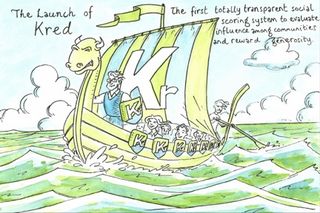Have you ever heard of Kred and Klout? No, they are not your long lost Norwegian relatives. They are new online social networking sites that are attempting to measure a person’s online influence.
 Both for these companies (and a few others as well) have created scoring systems that attempt to put a value on the combined online influence a person has on various online social networks. The Klout scores work on a scale of 1 to 100, while the Kred scores range from 1 to 1,000. In both cases, the higher the score, the more influence the person has established online.
Both for these companies (and a few others as well) have created scoring systems that attempt to put a value on the combined online influence a person has on various online social networks. The Klout scores work on a scale of 1 to 100, while the Kred scores range from 1 to 1,000. In both cases, the higher the score, the more influence the person has established online.
As I mentioned in our last discussion, marketers are very interested in finding and working with people who have a lot of online influence. If you can get a highly influential person to support your product online, good things can happen...this has been the case for some time.
The idea of a hiring manager researching a person’s online activities is not a new or uncommon idea either. Dr. John Sullivan makes this point in a recent ERE article:
“It is now quite common to find, assess, and do reference checks on candidates using Google searches, LinkedIn, and Facebook profiles, and the assessment of work samples that can be found online. In fact, a Microsoft-sponsored survey conducted by Cross-Tab found that 79% of HR and recruiting professionals responded that they currently use online reputation information as part of their hiring process.”
What is new is an attempt to measure this online influence in a way that one person can be easily, quickly, and fairly compared to another person. The jury is still out on whether such a comparison can truly be fair, but we’ll leave that for the HR technicians to debate.
What I do think is worth noting is a potential connection between an individual who has a high Klout or Kred score, and the skills and capabilities that can be very useful in the real world. Dr. Sullivan catalogues some of these talents:
- Communications – they have shown that they are effective and frequent communicators
- Relationship building — they are successful at attracting and building relationships with others
- Influencing – they have the ability to influence others and to get others to read and spread their messages
- Reputation — their reputation, credibility, recommendations, and ability to produce “Liked” content means that they will be listened to
- Reach – their extensive contacts, friends, followers, and subscribers means that any messages they send will reach thousands
- Branding – individuals with high social media scores have demonstrated they know how to build a personal brand and that knowledge may be transferable to product branding
- Crowdsource solutions — their extensive network means that they will be able to quickly “crowdsource” answers to problems that they encounter
- Writing ability — individuals who have a long blog history have demonstrated both their writing style and ability
- Knowledge of technology — they have demonstrated that they are on the leading edge of social media technology
- Adaptable – they are capable of continually adapting to the rapidly changing social media environment (if they have maintained their scores over a period of time)
Are these the skills that you’d like in the next agent you hire? I can’t say that I’ve seen a more complete  list of the characteristics that would make someone successful as a real estate agent! If an online social networking score reliably benchmarked these skills, then you may have just stumbled onto the Holy Grail of real estate recruiting!
list of the characteristics that would make someone successful as a real estate agent! If an online social networking score reliably benchmarked these skills, then you may have just stumbled onto the Holy Grail of real estate recruiting!
Like most things that sound too good to be true, there are a few caveats worth noting. First, these measurement systems are in their infancy. Ask around the office and see how many people have a Klout score. Probably none. Now ask how many have Facebook pages. Probably most. Facebook became a lot more interesting and useful once everyone was using it.
The same is true for a Klout score. Until a majority of candidates standardize on a common scoring system, use the system, and are willing to reveal it during the recruiting process, the concept will have limited value.
Secondly, these scores can be manipulated. By nature, each provider will have weaknesses in their approach to capturing and evaluating the data. And, just as search engine optimization techniques are used to manipulate web page rankings, these weaknesses will be exploited by some candidates in an effort to increase their scores.
For now, have some fun with this concept. Go to one of the sites, register, and find out how influential you are in the world of online social networking. Then, keep your eyes on this concept... If it grows, it may become very useful.
 Editor's Note: This article was written by Ben Hess. Ben is the Founding Partner and Managing Director of Tidemark, Inc. and a regular contributor to WorkPuzzle. Comments or questions are welcome. If you're an email subscriber, reply to this WorkPuzzle email. If you read the blog directly from the web, you can click the "comments" link below.
Editor's Note: This article was written by Ben Hess. Ben is the Founding Partner and Managing Director of Tidemark, Inc. and a regular contributor to WorkPuzzle. Comments or questions are welcome. If you're an email subscriber, reply to this WorkPuzzle email. If you read the blog directly from the web, you can click the "comments" link below.




Comments